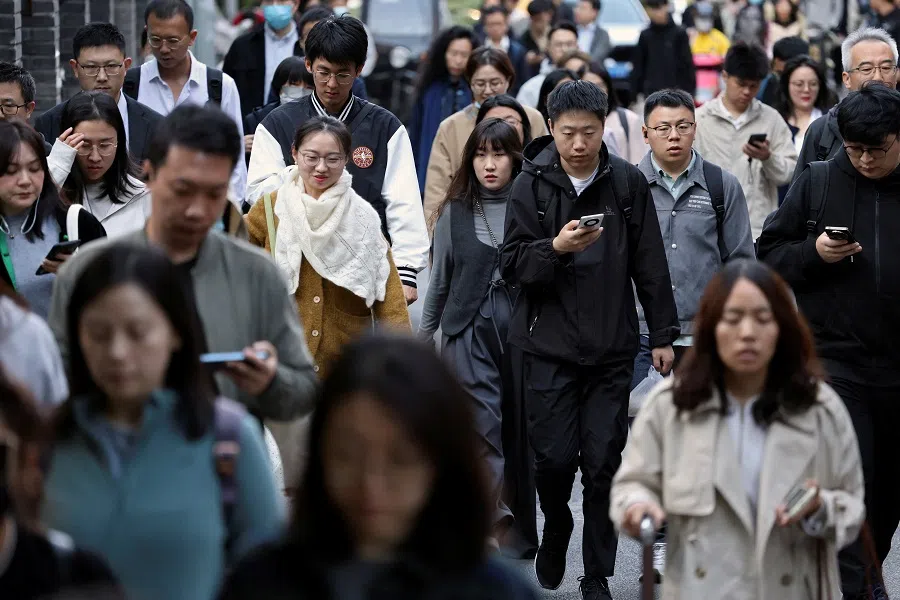Why don’t the Chinese spend?
Will measures like salary increases and vouchers be able to boost domestic consumption and a sluggish Chinese economy in 2025? Lianhe Zaobao correspondent Sim Tze Wei tells us what observers have to say about the issue and evaluates the effectiveness of government measures.

On the last day of 2024, Bloomberg cited people familiar with the matter as saying that the Chinese government has implemented a nationwide salary increase for civil servants for the first time in years, in a bid to spur spending.
The report pointed out that the wage hike was backdated to July 2024, and that the percentage increase varied depending on the base salary. One person familiar with the matter said that it amounted to a raise of roughly 5%, although the Chinese government has not confirmed this.
These turn-of-the-year reports of civil servant pay raises have once again shifted public attention towards consumption.
Dismal rates of domestic consumption in 2024
Following the Covid-19 pandemic, China’s property market has remained sluggish, while its stock market is volatile. Business closures, coupled with rising unemployment, have further compounded the situation, directly impacting consumer spending power and desire.
China’s retail sales expanded 3% year-on-year in November 2024, well below the 5% forecast. Household consumption in China accounts for less than 40% of GDP, considerably lower than the approximately 65% seen in other developed economies.
Where will the money for civil servant pay raises and subsidies for those in need come from?

Apart from reported civil servant pay raises, China’s Ministry of Civil Affairs also encouraged local governments with financial capacity to step up one-time allowances to those in need as 2025 approached, ahead of New Year’s Day and the Spring Festival. Eligible groups included some unemployed individuals and struggling jobless college graduates. This move not only stabilises public sentiment but also boosts consumption.
US President-elect Donald Trump’s repeated threats to impose heavy tariffs on Chinese goods have cast a long shadow over China’s export prospects, even before he takes office. Should a China-US trade war erupt and exports falter, domestic demand will have to pick up the slack.
Optimistic outlook for consumption in 2025?
Amid increasing internal and external pressures, China is increasingly focusing on demand-side policies. Last month’s Central Economic Work Conference put “vigorously boosting consumption” as the first of nine key tasks for the year’s economic work, highlighting the importance of consumption in driving economic growth.
State media have also ramped up reports of new consumption trends and vitality, seemingly paving the way for a strong year for consumption in 2025. In an instant, consumption has become the key to driving the Chinese economy.
Where will the money for civil servant pay raises and subsidies for those in need come from? The source remains expansionary policies, specifically the shift announced by the government from a “prudent” to a “moderately loose” monetary policy, and from a “proactive” to a “more proactive” fiscal policy.
Only hard cash can boost market confidence.

In his 2025 New Year message, Chinese President Xi Jinping also reiterated the need to implement “more proactive and effective policies” to maintain positive momentum in economic and social development.
From the Politburo meeting in September 2024 to the Central Economic Work Conference in December 2024, and then to Xi’s 2025 New Year address, the “proactive and effective” policy tone has been made abundantly clear. It is generally believed that the higher-ups of the Chinese Communist Party have reached a consensus on key economic indicators such as the GDP growth target and deficit ratio for this year. However, according to legal procedures, these will not be officially announced until the “Two Sessions” (两会, annual sessions of the National People’s Congress and the Chinese People’s Political Consultative Conference) in March.
Chinese officials and state media have repeatedly emphasised that the central government’s deficit rate and debt capacity space have significant room for adjustment. It is generally speculated that this year’s deficit rate will surpass the psychological threshold of 3% fiscal discipline, and potentially approach or even exceed 4%. Experts have pointed out that a 4% deficit rate can serve three functions: expanding total demand, sending a strong signal of stable growth to stabilise expectations and alleviating local fiscal pressures.
Boosting consumption no easy feat
Only hard cash can boost market confidence. Once public spending increases and liquidity is enhanced, consumption willingness is expected to improve across the board, with some conditions. Policies implemented will have to stimulate consumption through measures like increasing subsidies or issuing consumption vouchers to enhance consumer capacity, and then shift fiscal spending towards healthcare, education and pensions (among other public consumption areas), which will in turn alleviate people’s concerns.
At some point, encouraging people to spend has become as difficult as encouraging them to have children.
Will 2025 become a big year for consumer spending in China then? Not necessarily. At some point, encouraging people to spend has become as difficult as encouraging them to have children.

In the same way that encouraging childbirth is harder to implement than policies that restrict having multiple children (since one cannot exactly issue fines for not having children), encouraging spending is also more challenging than dissuading it. Discouraging spending can be achieved by implementing stricter regulations on credit products or by raising borrowing costs. On the other hand, a feasible approach to stimulating spending in the short term involves the direct distribution of consumption vouchers. This is because the “you might as well use it since it’s free” mentality is a normal psychological reaction.
Will vouchers boost consumption?
However, the decision on whether or not to issue consumption vouchers is also controversial. According to one perspective, China should not implement policies that appear to encourage “freeloading” as it is a country that values hard work and wealth accumulation, unlike Western consumption-oriented nations.
Another perspective argues that methods of boosting consumption should not rely on artificial stimuli, but instead on improving people’s livelihoods, such as helping businesses overcome difficulties, mitigating the impact of unemployment and reducing unfair income distribution.
Still, another viewpoint asserts that as China’s economy develops, consumer demand has shifted from goods-based consumption to service-based consumption, such as domestic tourism. Boosting consumption would therefore require upgrading the supply side of consumer goods.
Consumption incompatible with Chinese system?
US economist and former chairman of Morgan Stanley Asia Stephen Roach offered another political perspective in his December 2024 article titled “China’s Struggles with a Consumer Society”.
Roach cited American experiences from John Kenneth Galbraith’s book The Affluent Society, and stated that the DNA of a consumer society possesses these characteristics: mobility of income and wealth, open communication and dissemination of information, individualism and freedom of choice, diminished inequality of lifestyles, intergenerational wealth transfers, and ultimately, the ability to elect political representatives.
“Is China’s political system incompatible with modern consumer culture?” — Stephen Roach, US economist and former chairman of Morgan Stanley Asia

Roach suggested that the modern Chinese political system prioritises stability and control, enabling the country to become the world’s “ultimate producer”. However, this prioritisation also means that China has not successfully cultivated a consumerist DNA in Chinese consumers. He thus posed the question: “Is China’s political system incompatible with modern consumer culture?”
Elevated to such a level, the question of whether or not to spend money becomes a political issue. Chinese leaders have repeatedly emphasised the need to follow a path of “Chinese-style modernisation”. Essentially, they mean to dispel the myth that modernisation equals Westernisation. Consumption may just be a touchstone for the Chinese approach.
This article was first published in Lianhe Zaobao as “2025中国消费大年?”.





